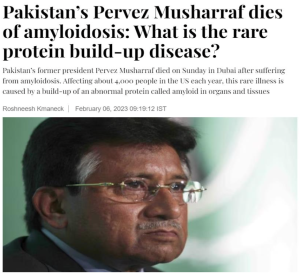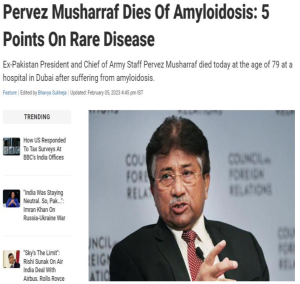

- Defined as a health condition of low prevalence that affects a small number of people when compared with other prevalent diseases in the general population.
- While there is no universally accepted definition of rare diseases, countries typically arrive at their own descriptions, taking into consideration disease prevalence, its severity and the existence of alternative therapeutic options.
- In the US, for instance, a rare disease is defined as a condition that affects fewer than 200,000 people
- Prevalence of 1 or less, per 1000 population is defined by the World Health Organization (WHO) as a rare disease
- According to the ICMR, a disease or disorder is defined rare in India if affect fewer than 1 in 2500 people.
Amyloidosis
- It is a rare disease that affects the heart, kidneys and liver. It occurs when a protein called amyloid builds up in organs and leads to impairment of their functioning. Such deposits can happen in the brain, kidneys, heart and spleen, and patients can experience it in one or several organs.
- Amyloidosis may be secondary to a different health condition or can develop as a primary condition. It can also happen due to mutation in a gene, but at other times the cause of amyloidosis remains unknown.
- Patients ailing from this rare disease experience tiredness, unexplained weight loss, shortness of breath, swelling in the abdominal area, legs, ankles and feet, tingling sensation or numbness in limbs, increased tongue size, purple spots on the skin around the eyes and unusual bleeding after injuries.
- Currently, there is no cure for amyloidosis. However, the condition can be managed with treatments like chemotherapy and stem cell transplant. Patients can also be treated using drugs and careful dietary restrictions, such as reducing salt intake. But without treatments, the disease can lead to organ failure.
National Policy for Rare Diseases 2021
Aim
- To lower the high cost of treatment for rare diseases with increased focus on indigenous research.
- Increased focus of research and development and local production of medicines will lower the cost of treatment for rare diseases.
- To strengthen tertiary health care facilities for prevention and treatment of rare diseases.
Categorization under policy
Group 1
- Disorders requiring one-time curative treatment.
Group 2
- Those requiring long term treatment.
Group 3
- Disorders for which definitive treatment is available but challenges are to make optimal patient selection for benefit, very high cost and lifelong therapy.
Financial Support:
- Group 1 diseases will have the financial support of up to Rs. 20 lakh(Previously 15 lakh) under the umbrella scheme of Rashtriya Arogya Nidhi.
Inclusion of Beneficiaries
- Not be limited to BPL families, but extended to about 40% of the population, who are eligible as per norms of Pradhan Mantri Jan Arogya Yojana for their treatment in Government tertiary hospitals only
Centres of Excellence
- Government aimed at designating eight health facilities as ‘Centres of Excellence’
- Also provided one-time financial support of up to Rs. 5 crore for upgradation of diagnostics facilities.
Voluntary crowdfunding treatment
- Setting up a digital platform for voluntary individual contribution and corporate donors to voluntarily contribute to the treatment cost of patients of rare diseases.
National Registry
- To ensure adequate data and comprehensive definitions of such diseases are available for those interested in research and development.
Screening
- The Policy also focuses on early screening and prevention through primary and secondary health care infrastructure such as Health and Wellness Centres and District Early Intervention Centres (DEICs) and through counselling for the high-risk parents.
- Screening will also be supported by Nidan Kendras set up by Department of Biotechnology.
Challenges
- Little is known about the pathophysiology or the natural history of these diseases particularly in the Indian context.
- Rare diseases are also difficult to research upon as the patients pool is very small and it often results in inadequate clinical experience.
- Availability and accessibility to medicines are also important to reduce morbidity and mortality associated with rare disease.
- The cost of treatment of rare diseases is prohibitively expensive. Various High Courts and the Supreme Court have also expressed concern about lack of a national policy for rare diseases.
- It is estimated that for a child weighing 10 kg, the annual cost of treatment for some rare diseases, may vary from ₹10 lakh to more than ₹1 crore per year with treatment being lifelong and drug dose and cost increasing with age and weigh.
- Even Group 1 is only for few and Group 2 has been openly left for the State government.
- The new policy has absolutely no consideration for Group 3 patients, who require lifelong treatment support.
- In the absence of a sustainable funding support for Group 3 patients, the precious lives of all patients, mostly children, are now at risk and at the mercy of crowdfunding.
Rashtriya Arogya Nidhi (RAN)
- Registered under the Societies Registration Act, 1860, as a Society.
- Provide financial assistance to patients, living below poverty line and who are suffering from major life threatening diseases, to receive medical treatment at any of the super speciality Hospitals/Institutes or other Government hospitals.
- Cardiology& Cardiac Surgery: Pacemakers, Stents
- Cancer : Bone Marrow Transplantation, Surgery
- Orthopedics Artificial prosthesis for limbs
- Neurosurgery
- Mental Illness
➡️UPSC 2023 General Studies Course: https://sleepyclasses.com/general-studies-for-upsc/
➡️Sociology Optional for UPSC : https://sleepyclasses.com/sociology-for-upsc/
➡️Political Science and IR for UPSC: https://sleepyclasses.com/psir-for-upsc/
➡️Signup here – https://sleepyclasses.com/
Have any query related to UPSC preparation: 📞Contact Us ► Toll-Free: 1800 890 3043 ► Mobile: 6280133177 ► Email: Sleepy.Classes@gmail.com ► WhatsApp: 6280133177



